Make Marketing Suck Less
Defense Against the Bro Marketing Dark Arts: How to Escape Manipulation & Make Good Business Investments
By Michelle Mazur > October 19, 2020
Filed Under Bro Marketing
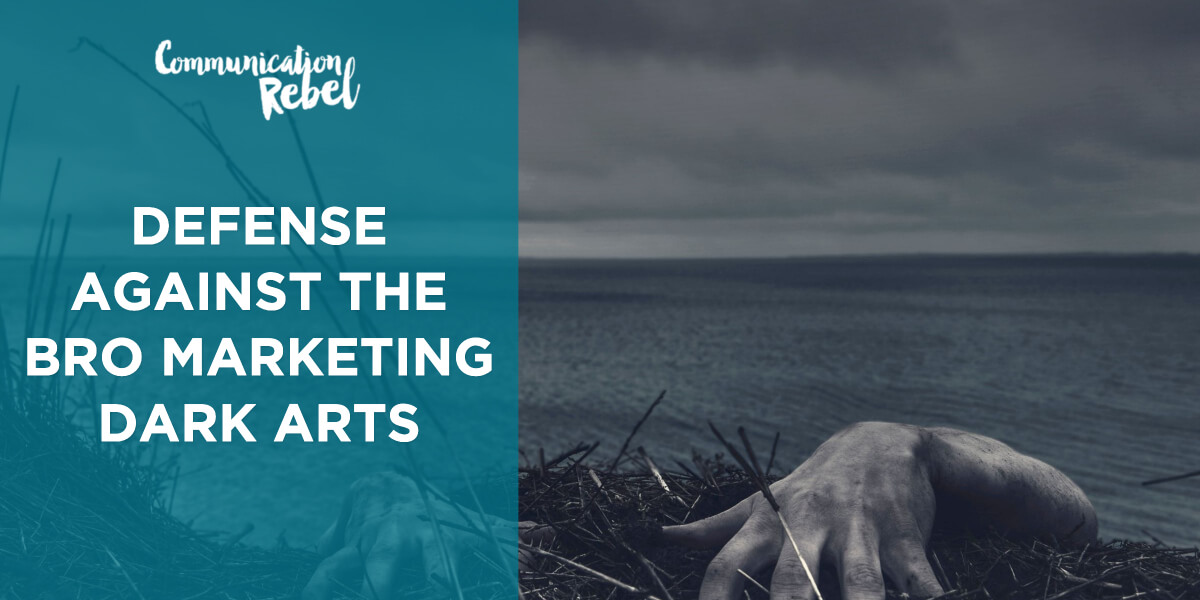
Bro Marketing. The online business world breathes it in like air.
If you don't think you've run into Bro Marketing before, consider the following the statement:
“Time is running out. This offer is only good until midnight. You’ll never be able to get this price again. You deserve to invest in yourself.”
Sound familiar? That's Bro-tastic marketing.
If you’ve hung around my podcast or blog for a while, you know how I feel about Bro Marketing. (If you don't, you can check out some thoughts here).
If you're wondering what Bro Marketing is, let me define it for you.
Table of Contents
- 1 101 Ways to Exploit the Work of Robert Cialdini
- 2 Why Bro Marketing Works?
- 3 Bro Marketing 101: The scarcity play
- 4 Trust Me, I'm an Expert: Manufactured Authority & Bro Marketing
- 5 How Bro Marketing Wears You Out: A million little yes’s
- 6 Results Not Typical: The Peer Pressure of Social Proof!
- 7 Liking a business owner is detrimental to your financial well-being
- 8 Fake Reciprocity – You OWE them NOTHING
- 9 Best Defense Against The Bro Marketing Dark Arts: THINKING
Bro Marketing is the act of promoting products and services using social triggers (i.e., scarcity, authority, social proof, etc.) so that you shut down your prospect's critical thinking ability so they BUY NOW.
Used in a sentence “All Tai Lopez does is Bro Marketing.'”
And yes, women business owners also use Bro Marketing tactics.
I’m on a mission to stop this practice and to show everyone that there’s a better way to market your business.
Or to quote Daenerys Targaryen:
“I’m not going to stop the wheel. I’m going to break the wheel.”
To do that, first I want to tell you how to protect yourself when you inevitably find yourself on the receiving end of Bro Marketing tactics.
If you've been business long enough, you've seen these tactics in action and most likely made a questionable investment or two (or twenty) because of these manipulative marketing practices.
101 Ways to Exploit the Work of Robert Cialdini
In Robert Cialdini’s seminal book Influence, he describes mental triggers that help us process persuasive messages without really thinking about it.
Rebel Truth: you are forced to make thousands of decisions a day.
Imagine if you walked into a grocery store and had to carefully evaluate what brand of coffee to buy. Weighing the pros and cons of each and every brand and variety before making a purchase decision.
You'd never leave the store! If you did leave, you would be exhausted!
Instead, we rely on familiarity & liking as a mental trigger to make a quick decision. I like Peet’s coffee. Peet’s coffee goes into my cart. I’m on to the next aisle.
Cialdini calls this “Click-Whirr” processing, and it’s awesome for low-risk decisions.
Making a poor low-risk decision may result in you losing a couple of bucks and not having your morning jolt of caffeine.
However, in the online business world, these mental triggers are being applied to high-risk situations where you are asked to spend hundreds if not thousands of dollars on courses and programs.
And you've got to do it FAST before the countdown clock hits zero.
Those high-risk decisions which ask you to outlay a significant amount of cash, time, and energy should be carefully weighed, thoroughly thought about before a decision is reached. (Much like you would research and critically think about what kind of car you would buy).
The question that you should be asking yourself that Bro Marketers don't want you to ask is…
Is this the right investment for my business at this time?
Cialdini wrote the book to protect you and me from being taken advantage of by the exploitation of the mental triggers he discusses in his book.
[Tweet “Defend yourself from the Bro Marketing Dark Arts”]
Instead, people like Jeff Walker and Frank Kern and their acolytes (some of the biggest names in the online world like James Wedmore, Stu McLaren, Marie Foreleo, and more) use all of these persuasive mental triggers at the same time to shut down their audience’s thinking and push them to make click-whirr decisions about pricey programs and products.
Why Bro Marketing Works?
Bro Marketing uses many of these triggers (like commitment and consistency, liking, reciprocity, and social proof) in tandem to shut down your rational mind and cause you to make irrational purchase decisions.
It works because your brain's #1 job is to conserve energy. Critical thinking uses a ton of energy.
When there is a presence of these mental triggers, your brain says “Great. We can make a quick decision because these triggers are present. No need to think.“
These decisions have cost people tens of thousands of dollars in cash with few results, not to mention wasted time.
In order for you to be a savvy consumer, let’s identify these triggers so that you know them when you hear them, discuss why they are so darn effective, and finally present ways that you can effectively combat the Bro Marketing Dark Arts.
Added bonus – you'll see where you're using them in your own marketing and you can make the decision whether it's ethical or not!
Let’s do this!
Bro Marketing 101: The scarcity play
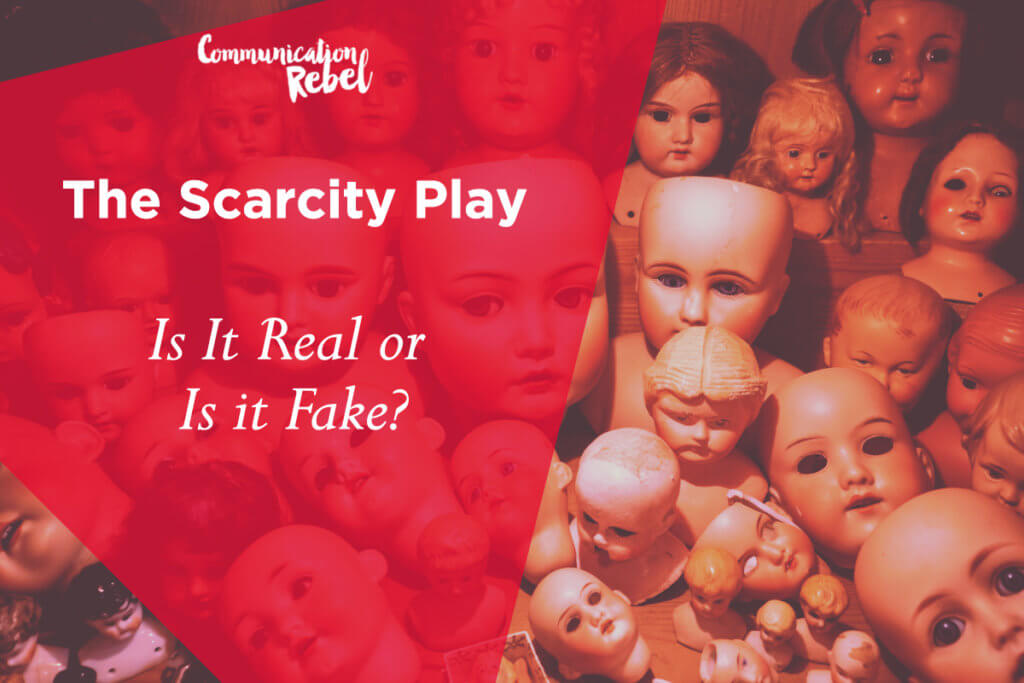
“Cart is closing today. I won’t be offering this program at this price ever again.”
Bro Marketers teach that you’ve got to limit the time a deal is available otherwise people won’t want to buy.
Creating a sense of urgency – buy now or never – is the key to closing the deal. (It works! If you ever launched a class, service, product, or held an event, most of your sales come on the last day).
Scarcity triggers our fear of missing out (FOMO). When we anticipate regretting missing out on something that perhaps we might want, our itchy buying finger hovers over the buy now button!
But let me let you in on a little secret, the scarcity play in online business is typically fake scarcity.
Most business owners, we'll be offering a program again with the same (disappearing) bonuses the next time they launch.
Sure, you might have to wait six months or a year before the opportunity to enroll comes back, but it will most definitely be back.
There’s a difference between real scarcity (there are only 10-spots available or the class starts tomorrow) and fake scarcity (only 20 copies of the ebook left or you’ll never get this price again).
The former is based on real limited availability. In your workshop, if you only have the capacity to serve 10 people well, then that's real scarcity.
The latter is based on fake scarcity that exists to ratchet up buying tensions and trigger your FOMO so you take out your credit card.
Know the difference between real and fake scarcity so you don’t fall for the scarcity play!
Defense Against the Persuasion Dark Arts: Before whipping out your credit card because you might never get this deal again, STOP and ask yourself is this REAL or FAKE scarcity. Better yet make a deal with your accountant or business bestie that you’ll discuss any purchase decision with her to see if FOMO is getting to you or are you buying because it’s a sound decision for your business.
Trust Me, I'm an Expert: Manufactured Authority & Bro Marketing
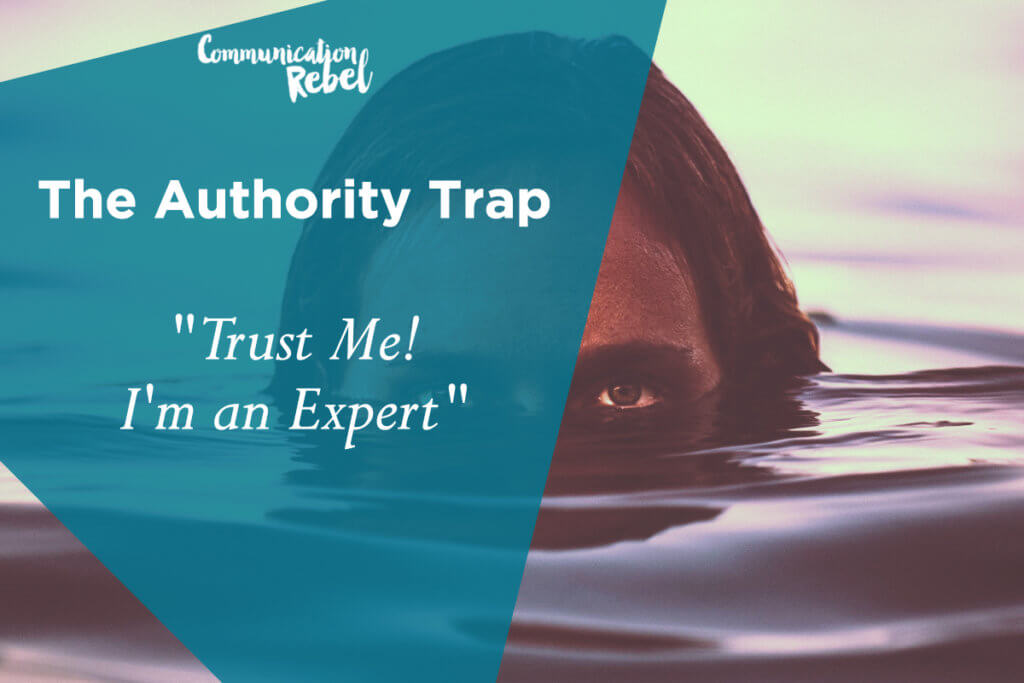
My first exposure to Bro Marketing tactics happened when I was brand new to my business, and I signed up for Jeff Walker's three-part video series on his Product Launch Formula.
(By the way, Jeff Walker's work is problematic AF and he's one of the industry leaders in abusing Cialidini's work. Kelly Diel’s has an excellent piece about Jeff Walker’s abuse of the authority trigger in his Launch formula.)
While I was watching the video series, my mouth hit the floor when Walker said that if you didn't have experience or weren't really an expert, it was not a problem. Just manufacture your authority using a rags to riches stories.
WTF?
The good old “I was sleeping next to my best friend's toilet, $127,898 in debt then I started my business and now I make a million dollars every month. I'm going to show you how.”
Don't have a rags to riches story? No problem just exaggerate your story.
And now you're an authority.
Rags to riches stories are problematic on the best day. I've talked about why here and here.
Manufacturing authority is outright lying.
Real experts state why they are an expert. Real experts don't need to manufacture their authority. Real experts (and most human beings) likely don't have a rags to riches story to draw you in. They don't need to.
If you're reading a sales page or attending a webinar, the coach or consultant launches into a rags to riches story, ask yourself “What makes this person credible to teach me this?”
Then run away if their story is carrying all the weight for what makes them credible.
When I do webinars, I just state my credentials. (Ph.D. in communication, 25+ years in the industry, worked with 100s of clients, did marketing & market research for companies like Microsoft, General Mills, Kraft and Burt's Bees…that's real expertise).
Defense Against the Persuasion Dark Arts: Before deciding to buy a program or service, ask yourself “What makes this person an expert on this topic?” If their only compelling credential is a rags to riches story or that they got this result for themselves, run away and find a real expert to help you.
How Bro Marketing Wears You Out: A million little yes’s
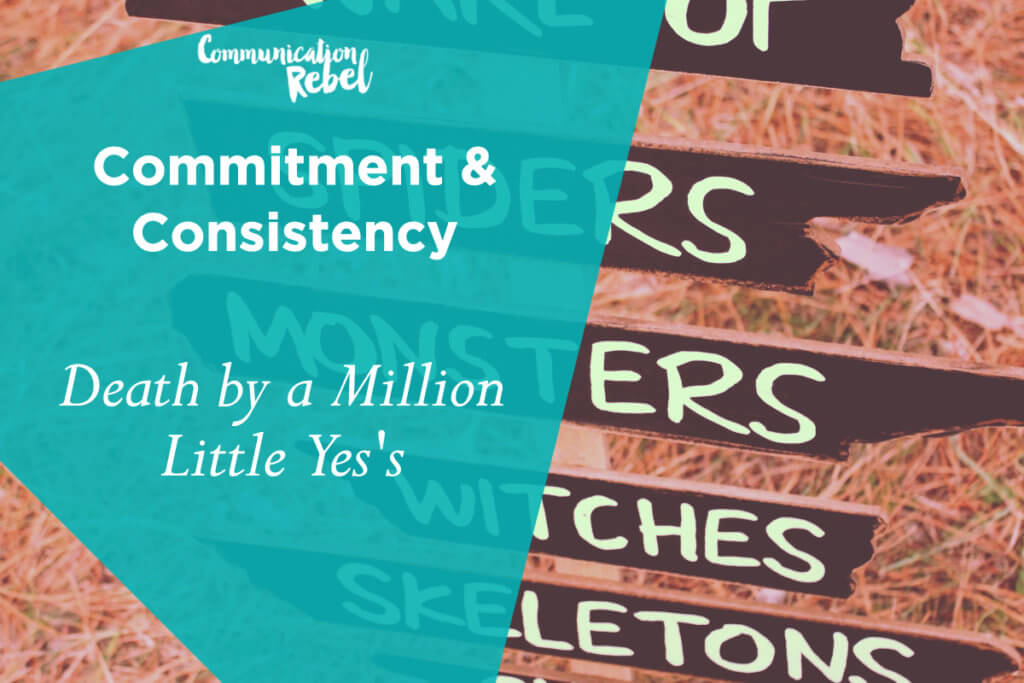
“Can I tell you my story?” the speaker asks.
Since the audience isn’t full of jerk faces, they reply with “Yes.”
“Do you want to know what happens next?” the speaker asks.
“Yes!” the audience says back.
“Can I tell you about how I work with people?”
“Yes!” the audience says back.
If you’ve found yourself trapped during a speak-to-sell speech, then you might have noticed that the speakers ask a million yes or no questions.
Callan Rush teaches this method of speaking. She tells her students that you ask permission to tell your story to be respectful of their time. After all, they are not there to hear about you so get permission first. It’s the polite thing to do.
Sounds lovely right? Getting permission to tell your story. How courteous! 🙄
Except that what seems like courtesy is hiding a sneaky persuasive trigger that Robert Cialdini calls commitment and consistency.
I know this is an example from the speak-to-sell world, but this happens all the time with Bro Marketers. It's known as the ascension model.
You say yes to a $27 product, then to a $47 upsell, and then to a $997 course.
What’s happening is that when Bro Marketers get you to say yes to a series of micro-commitments, you’re establishing a pattern (and some argue that you’re changing their identity with each little yes).
The more they say “yes,” the more they become the type of person who says yes to that Bro Marketer.
Then when an offer is made at the end of the funnel, it’s consistent with your past behavior to say “Yes, I’ll buy it!” Whip out your credit card and go further into debt.
If you say no, it triggers what psychologists call cognitive dissonance which is an uncomfortable tension or anxiety when you hold two conflicting beliefs at the same time.
If you’re the type of person who said yes before, it’s going to feel bad to say no. To relieve the discomfort, the easiest path is to change your answer from no to yes.
The whole point of speak-to-sell formulas and the ascension model is to ratchet up the buying tension and anxiety to the point where the only way to relieve that tension is to buy.
It’s manipulation to the core.
But this insidious micro-commitment scheme has another manipulation wallop it packs on the audience.
It leads us to decision fatigue.
According to psychologists: “decision fatigue refers to the deteriorating quality of decisions made by an individual, after a long session of decision making. It is now understood as one of the causes of irrational trade-offs in decision making.”
Former President Obama wears the same suit nearly every day. Why? He doesn’t want to waste his decision making energy on something silly like figuring out what tie to choose.
Every decision you make. Every yes you say during a speech or a webinar or in a funnel is meant for one thing and one thing only – to wear you out.
The goal is to shut down your rational brain that thinks about large decisions and to drain your energy so that you make an irrational decision.
Like spending $5000 on a group coaching program.
Defense Against the Persuasion Dark Arts: Here’s the first way you can defend yourself: refuse to make a decision. Do not participate in the yes/no ask-a-thon (and that’s hard because of the next persuasive trigger…social proof). Save your decision-making energy for the inevitable ask.
Results Not Typical: The Peer Pressure of Social Proof!
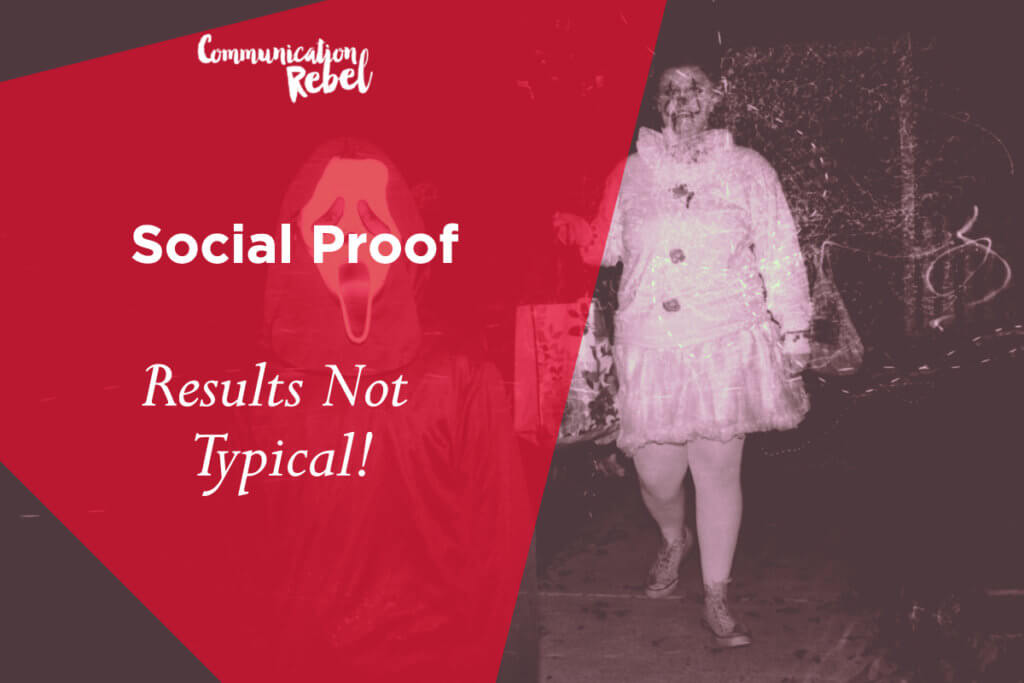
“I took my business from $0 to 7-figures in just 3-months because of this program.”
Testimonials.
Do you know how on weight-loss products the testimonials come with an asterisk that says “RESULTS NOT TYPICAL”?
Bro Marketers need this warning tattooed on their forehead.
Most of the major programs that launch once or twice a year have in-credible testimonials (meaning not at all credible).
The testimonials give an overhyped result (like making 8-figures in 8-seconds or I land on the TED stage by being exactly who I am!).
The testimonials don't give any context as to who these people are, how long have they been in business, what their experience was before enrolling in the program.
Heck, some people use testimonials for a $3,000 DIY course from people who are in their $20K high priced mastermind (because that's fucking equivalent).
These atypical results and testimonials make you think “Well if that person got amazing results, surely I can too.”
Bro Marketers are counting on you to think that to see their course or program as the magic bullet that will cure everything that ails your business!
Why does social proof work?
When you’re unsure about what to do in a situation (like to buy or not to buy), we take cues from what other people around us are doing.
Not sure what fork to use at the table? Look around and see what everyone is doing. Follow their lead.
If you’re not sure that you want to buy a program, looking at the testimonials of business owners just you is a super persuasive way to get people to lay down their hard-earned cash.
What do all of those people who said YES before you know that you don’t know? If it’s right for them, it should be right for you. After all, you know Jasmine from Instagram and she's got a testimonial on this sales page.
Maybe you should buy the program too?
No, you should absolutely not base your purchasing decisions based on what the crowd is doing.
It reminds me of something my mom (rest her soul) said when I was growing up, “If all your friends jumped off a bridge, would you jump too?”
As a 14-year old, the answer was yes, but as someone who studied persuasion as part of her academic upbring the answer now is HELL NO!
Defense Against the Persuasion Dark Arts: When you see those results not typical testimonials on the sales page, I want you to think NOT TYPICAL. Heck, visualize an asterisk next to that testimonial givers headshot to remind you that you don't know their full story. If you are truly interested in a program, find people who took it and ask them their experience. Find out their backstory and make an informed decision.
Liking a business owner is detrimental to your financial well-being
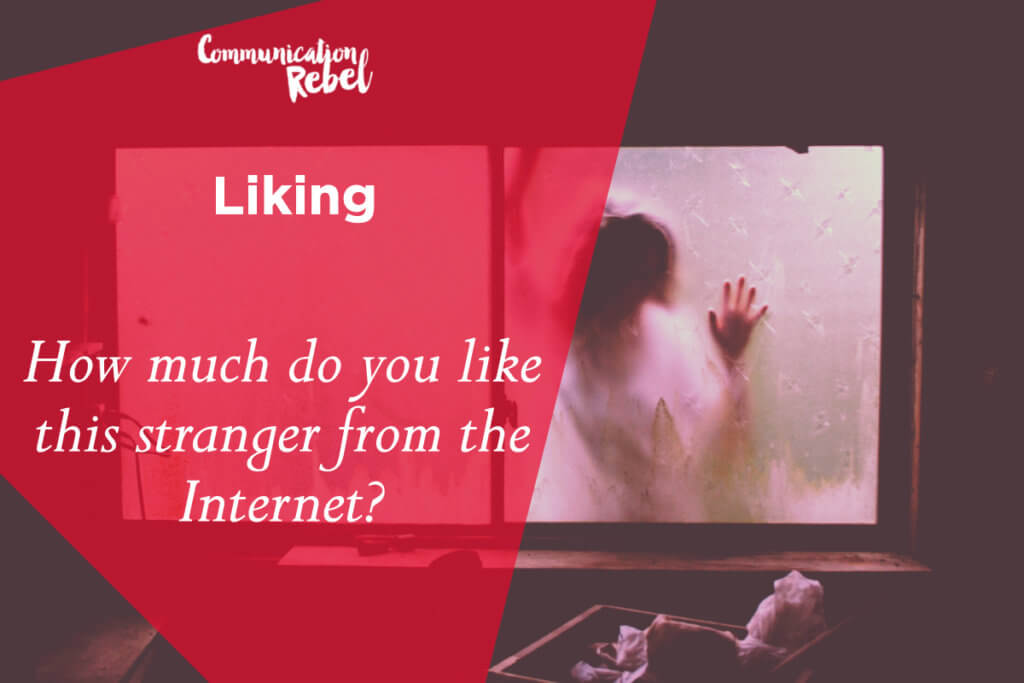
We buy from people that we know, like, and trust. That’s buying psychology 101.
How do Bro Marketers get their audience to like them (to really, really like them)?
They tell them their story. The trials and tribulations they faced. How they overcame those trials. They make you feel through their story that they are just like you.
“I’ve been where you are now. And if I can do it. You can do it too.”
Or as President Bill Clinton once said “I feel your pain.”
This is the tricky part. As a business owner, you want your audience to connect with you, to laugh with you, feel your frustration, and to learn from your experience. It’s a part of building a relationship.
I teach my clients to use signature stories in the 3 Word Rebellion Messaging Intensive as a way to emotionally connect.
And when this superpower is used for good, it’s an amazing way to help informed buyers to make the decision to work with you. When it’s used to get you to part ways with your cash, it’s downright dangerous.
But liking someone can be downright detrimental and cause us to make risky buying decisions.
My advice is to view a launch sequence, webinar, or a speak-to-sell speech like a date – not even a date – more like a quick meet-up for coffee to see if you should start dating.
Most likely, you know very little about this coach in REAL LIFE.
They are a stranger. Yet, this stranger on the stage, after delivering a 60-minute webinar (that's typically full of results not typical social proof) is asking you to INVEST your money.
Imagine if you were on a coffee date. Things seemed to be going well. Your date was charming, funny, and told great stories. You liked their energy and vibe.
Then….
…they asked you for your social security number so that you could buy your dream home together.
You’d sprint away from that Starbucks without looking back.
After a 60-minute webinar or 3-part video series (where if you're lucky they’ve given you great content), they ask you to buy their $500, $1000, $10,000, or $20,000 program.
It’s time to sprint away.
The fact is they have not built a relationship with you that is necessary to allow them to make this large of an ask or to be pressured to buying RIGHT NOW!
You’re not buying a diet coke (a low-risk) investment instead they are asking you to take a big risk on investing in a program that you’ve not fully vetted.
The higher the investment, the more risk to you, and the more you need to think about the decision.
It doesn’t matter how much you like someone. It matters that you make a wise investment of your time and money.
Defense Against the Persuasion Dark Arts: Ask yourself “do you like this coach/consultant stranger on the Internet more than you should after a 60-minutes?” And the answer to this question is YES always yes. If you’re interested in what they have to offer, do not buy now (remember you can get the deal later). Instead, investigate them further. Check out their website, read their testimonials, ask for case studies. Vet the person and their offer thoroughly.
Fake Reciprocity – You OWE them NOTHING
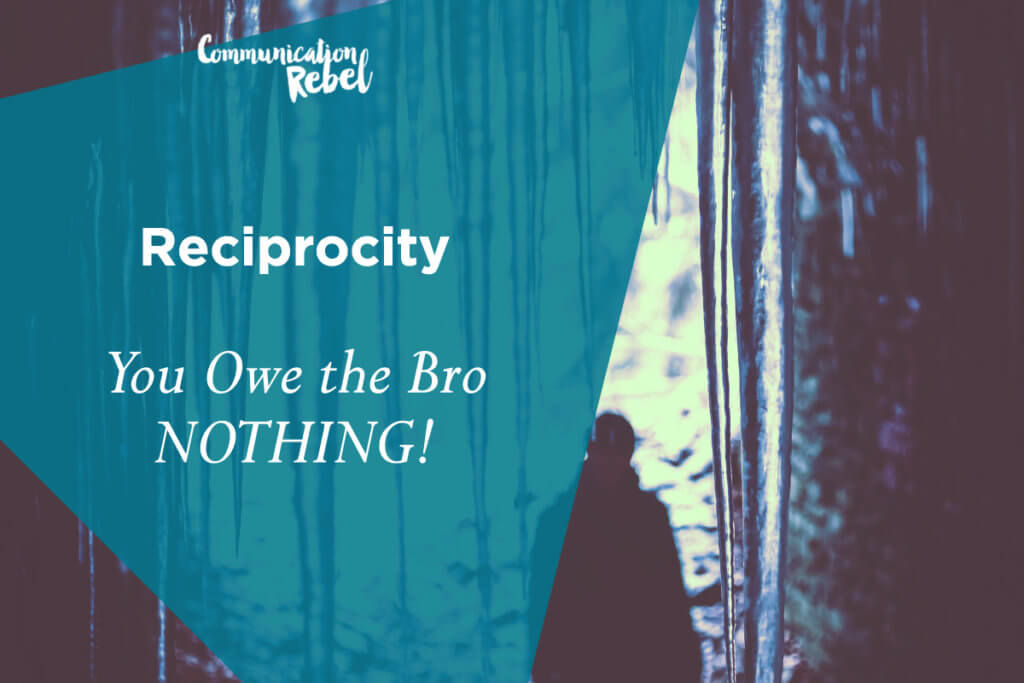
Finally, we arrive at one of the most subtle of all persuasive triggers, reciprocity.
Reciprocity is an instinct that all humans have. When someone gives to us, we like to give back. We don’t like to feel in the debt of others.
Someone compliments you, and you compliment them back.
You get a free cream puff at Costco, and you buy 6 more cream puffs.
A “guru” gives you great content on a free webinar, and then you drop $5,000 on their program.
Does something seem out of whack there? Like the trade-off just isn’t fair?
You’re right. The exchange being suggested by the Bro Marketer isn’t fair.
You owe them NOTHING.
You gave this person your email address, your time, and your attention.
In exchange for all of that, the Bro Marketer (hopefully) gives you amazing, helpful content that you can use to take action.
That's the energetic exchange. Email address, time, and attention for the helpful webinar.
Bro Marketing formulas are based on tit-for-tat reciprocity. The Bro Marketers' goal is to make you feel like you owe them something. The pull to not feel indebted to someone is undeniable. The way to resolve that pull is to buy.
Except you don't have to BUY, you've already fulfilled your end of the bargain when you signed up.
Remember, you owe that person nothing, and you don’t need to “over-reciprocate” for the content that is delivered.
Defense Against the Persuasion Dark Arts: Remind yourself what the real exchange is in a webinar or a video series or even a free opt-in. Your time and attention for the content and experience of the webinar. If you feel the pull to reciprocate more, ask yourself if the value you’re about to exchange (cold-hard cash) is proportional to what the Bro Marketer gave you.
Best Defense Against The Bro Marketing Dark Arts: THINKING
Bro Marketing formulas are based on persuasive triggers that aim to do one thing: shut down your thinking and get you to buy automatically.
When they are used in tandem, they are super effective in getting people to buy.
However, (as you and I both know from experience) people often feel regret about the decision they made in the heat of the moment, and end up resenting the Bro Marketer for pressuring them into a buying decision afterward.
Your best defense against Bro Marketing (or any high-risk purchase decision from buying a timeshare to enrolling in Drumpf University) is to use your brain.
Don’t be rushed into making a decision because the offer will come back around.
Just because you said “yes” 20 times earlier in a speech. Doesn’t mean you have to say yes to the offer.
Think about the pros/cons of the investment. Will you get a return on the investment? Is this person the “right” person for you to work with? Are their testimonials all about how “great they are” or are they about the results their clients see.
Protect yourself by THINKING in this bananas Bro Marketing world that we live in.
And if you’re a business owner thinking “I don’t want to be a Bro, but I want to make money from business” stay tuned for when I’ll walk you through a better, more ethical way to sell and market.
Create Your One-of-a-Kind Message
Your 3 Word Rebellion is the Key to Growing Your Business & Impact






